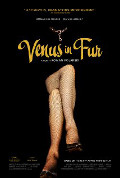
Poland 2013
Directed by
Roman Polanski
96 minutes
Rated MA
Reviewed by
Bernard Hemingway


Venus In Fur
Synopsis: An actress (Emmanuelle Seigner) attempts to convince a director (Mathieu Amalric) to cast her in his upcoming stage production.
I was somewhat underwhelmed by Roman Polanski’s last film, Carnage, which, like Venus In Fur was adapted from a stage play. This time around I have no such reservations. Whereas the latter was a mildly diverting comedy of contemporary middle-class manners, Venus In Fur is a multi-layered disquisition on the politics of sex, polymorphous perversity and the lengths an aging actress has to go to land a part, matters clearly much closer to the director’s heart (just in case we didn't realize this, Amalric is made up to look like a younger Polanski) than depicting the squabblings of self-satisfied New Yorkers.
I’ve always been rather leery of Emmanuelle Seigner as an actress whose career is largely based on her obvious sexual allure but here she gives a formidable performance as a woman who puts that allure to devastating effect on Thomas, a playwright directing his own adaptation of Leopold von Sacher-Masoch’s infamous 1870 erotic novella, "Venus In Fur". When we first encounter her she is a bedraggled mess to whom the director, frustrated by a series of lame auditionees, is ready to give short shrift. By the film’s end he is in drag, tied to a giant phallus as she, a terrifying bacchante, cavorts naked around him. How this transformation is brought off is by first class writing from author David Ives, with whom Polanski developed the script, compelling performances by Seigner and Amalric and a seamless transposition to the big screen of the original Tony Award winning stage production. So good are all these aspect it is a pity that, unless one is fluent in French, sub-titles are a necessity.
Polanski is a director for whom issues of sexual identity and the dark side of the libido have coursed through both his life and work. Venus In Fur can readily be seen as a head-on revisitation of the themes of his brilliant 1966 black comedy, Cul De Sac, with Amalric in the Donald Pleasance role and Seigner taking the part of Françoise Dorléac, twinned protagonists who partake of some dangerous psychological game-playing. Ive’s play however, perhaps barring a slightly awkward Sacher-Masoch 101 introduction, is a much more tenacious exploration of the social construction of identity and the hidden recesses of the psyche, albeit not in a didactic way. The two actors play out their mutually-dependent fantasies with consummate skill, morphing from identity to identity and back again as slowly the ties that bind them together get tighter and tighter.
The film belongs to Seigner, who progresses from slightly ratty auditionee to Marlene Dietrich-like femme fatale to Olympian goddess with commanding ease. That she is Polanski’s wife no doubt helped, both in terms of her confidence in a very demanding role and the director’s knowledge of her capabilities. Amalric, has the less showy part, the dominated to Seigner’s dominatrix, but he is equally good as his Thomas is gradually consumed by Vanda’s erotic potency.
Want something different?





